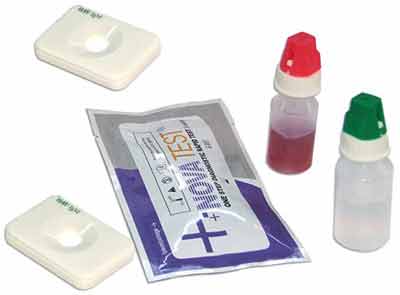ASA Dot Assay Kits
We supply ASA IgG, IgM and IgA rapid test kits which are based on the dot filtration immuno assay principle, used as an aid in the diagnosis of infertility in male and unexplained miscarriage in women.

Intended Use
Anti-sperm antibodies (ASA) Dot filtration assay kits are a series of Immuno Gold filtration rapid assay kits, which are used to detect three sub-categories of antibodies (IgG, IgM and IgA) specific to male's sperms in human serum, and are intended to be used as an aid in the diagnosis of male infertility and unexplained female miscarriage.
ASA Causes Infertility
Sperm of humans is considered to be antigenic, which is targeted as intruder by the human immune system. As a result, antisperm antibodies (ASA) are produced, which can bind to the sperms thus causing the decrease of the motility of the latter. If more than 10% of the sperms are immobilized in this way, the fertility chance will be significantly lower, and chance of the infertility rate will increase.
Anti-sperm antibodies are invariably present in both females and males. However, the degree of ASA occurrence may vary according to individual and gender. The rate of ASA positive is usually between 10-30% in the serum of the infertility male patients; the rate is significantly higher among the azoospermia patients, which can be as high as 60%. And these antibodies are the cause of approximately 7% of male infertility incidences. The anti-sperm antibodies can bind to sperm, inhibiting the movement of the sperm, stopping recognition and entry into the egg, or targeting sperm for destruction when they reach the female reproductive tract. High ASA concentration in the serum of the patients is a significant cause of autoimmune infertility. If more than 10% of the sperm are bound to anti-sperm antibodies (ASA), then infertility is suspected. The ASA positive result with ASA Dot Assay kit offers a valuable prognostic indicator in the diagnosis of infertility.
ASA Antibodies and Infertilities
Anti-sperm antibodies (ASA) are produced by cells of the adaptive immune system in males. There are many ways that anti-sperm antibody can act unfavorably to the conception process, which include: the ASA antibody can obstruct sperm from penetrating cervical mucus; inhibit the ability the sperm adheres to and penetrates the zona pellucida; interfere with sperm's ability to contact and bind to the zona pellucida; inhibit sperm's fusion with vitelline membrane; prevent sperm penetrating and fusing with the egg, prevent fertilization; even the egg is fertilized, the anti-sperm antibody can also cause abortion by unfavorably affecting the embryo.

 Atlas Link Technology Co., Ltd
Atlas Link Technology Co., Ltd